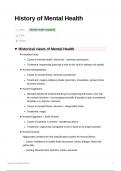Summary
Psychology A-level OCR: Summary of History of Mental Health (Unit 3 Applied Psychology-Mental Health)
- Course
- Institution
Features of the history of mental health for Unit 3 (Mental health) in Psychology A-Level OCR. Answers were model answers given by my teacher or my own answers that have been thoroughly corrected by my teacher.
[Show more]



